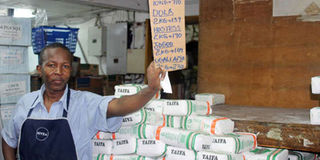Talk about ‘unga’ is cheap, but can become expensive over time

An attendant at A-One supermarket in Mombasa displays the prices of maize flour on May 2, 2017. The popular talk in town has created a bubble effect on the food prices. PHOTO | WACHIRA MWANGI | NATION MEDIA GROUP
What you need to know:
- The prices of other basic commodities like sugar and milk have equally inflated. Sadly, this was expected.
- Retailers are selling the food items higher than they actually are, courtesy of the popular opinion that food is expensive.
In 1636, the prices of the favourite tulip flowers went up by over 5,000 per cent in Netherlands.
Talk of the viceroy flowers being in short supply was ripe.
The tulips cost more than three times the price of a house in Amsterdam then.
The hiked prices made them even more attractive. Of course, the bubble burst in 1637 and the prices corrected to less than a hundredth.
STOCK PRICES
More recently, the 2008/2009 recession caused a market crash across the globe.
Analysts pointed out, rightly, that the prices of these shares were worsened by the panic of green investors.
The doom talk made many who were new to the market actualise their paper losses at less than competitive prices.
While stock prices indeed dropped significantly, a 50 per cent drop would have at least a 15 per cent panic component.
In Kenya, traders plunged the country into the quail eggs bubble in 2013.
The media joined in and the result was a price hike that saw a single quail egg retailed at over Sh300, up from Sh20 the previous year.
The natural rules of economics played out and the prices dropped to normal after a few weeks.
EXPENSIVE FLOUR
The laws of demand and supply follow through the lines of people’s perceptions and beliefs.
This is why a brand new Mercedes Benz would be sold at twice as much as a Toyota saloon car; people believe the Mercedes is better.
I was shopping for a phone a few weeks back and I was naturally inclined towards known superior brands, though I was duly informed there are better, cheaper alternatives.
There is no doubt that unga (maize flour); the basic input for the Kenyan staple food ugali, has become expensive.
Poor harvest and poor management are cited as some of the causes.
The prices of other basic commodities like sugar and milk have equally inflated. Sadly, this was expected.
FOOD PRICES
Naturally, it is the subject of conversation across the country.
Social media is awash with unga price jokes and memes.
One said that a popular food joint has suspended offering ugali saucer (additional ugali helpings) to its patrons until further notice.
Another gentleman intimated that given his girlfriend likes expensive things; he will get her unga, sugar and milk for her birthday.
Additionally, mainstream media is religiously covering unga price frenzy.
Naturally, the opposition politicians are using it as a rallying call and Parliament debated it this week.
PUBLIC DEBATES
The results are evident. When the discussion started, most retailers priced the commodity at 140 to 150.
Now the retail price has shot to 160 to 180. If no action is taken, I foresee it rising to 200.
At least 15 per cent of that price is informed by the high-price talk.
But the expensive talk is not affecting the price of unga only.
A student at Pwani University shared with me over the week that their popular CMB (chapati mbili beans) joint now sells beans at Sh30 from up from Sh20 bob.
Ironically, Kenya predominantly imports beans from the region and the wholesale prices of beans in Tanzania and Uganda remains stable.
FISCAL MANAGEMENT
The popular talk in town has created a bubble effect on the food prices.
Retailers are selling the food items higher than they actually are, courtesy of the popular opinion that food is expensive.
This works to the advantage of several cartels of middlemen.
Undoubtedly, the only recourse to high food prices is responsible fiscal management.
The irrigation projects need to be actualised and the country needs to support and subsidise local production to minimize food imports.
The writer is the CEO of Elim Capital. @odhiamboramogi




